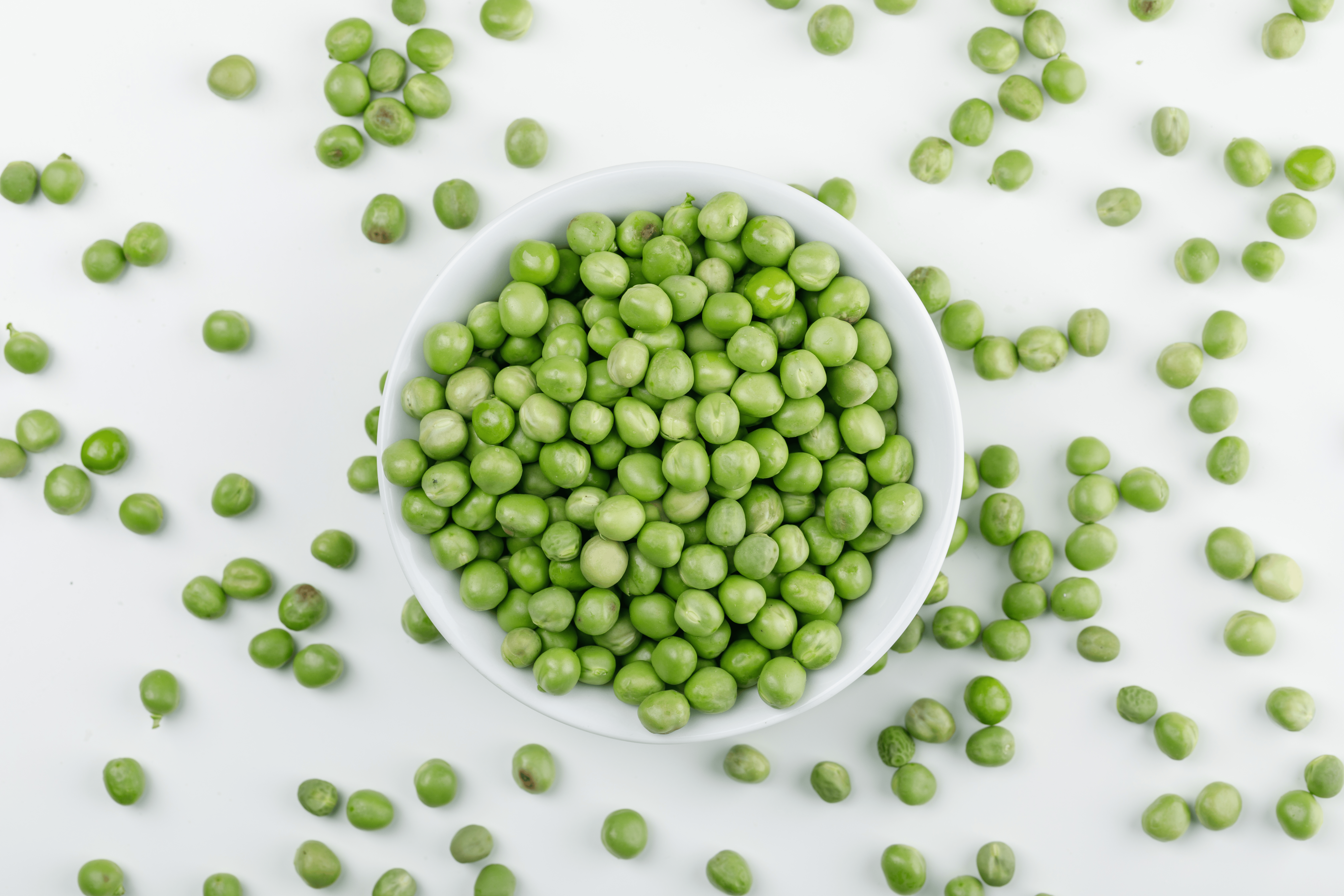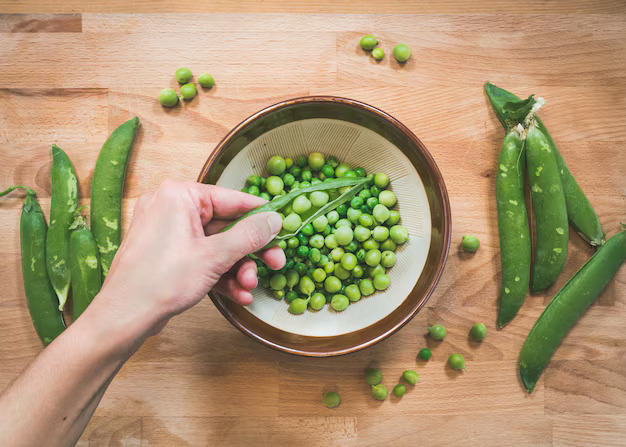7 Health Benefits Of Peas
Peas may appear small and humble, but they pack a powerful nutritional punch that many overlook. As one of the oldest cultivated crops, peas have been a staple in various cultures for thousands of years.
From soups and stews to side dishes and protein-rich snacks, peas are as versatile as they are healthy. In this comprehensive guide, we delve into the 7 health benefits of peas, exploring how this simple legume can contribute significantly to your well-being.

1. Rich Source of Plant-Based Protein
One of the most notable health benefits of peas is their impressive protein content. This makes them an excellent option for vegetarians, vegans, and anyone seeking to reduce their meat consumption.
- Protein Content: One cup of cooked green peas contains approximately 8 grams of protein. This is comparable to the protein in a glass of milk.
- Muscle Maintenance: Protein is essential for muscle repair and growth, especially important for athletes and physically active individuals.
- Satiety: High-protein foods like peas promote a sense of fullness, which can help with weight management and reducing unhealthy snacking.
In addition, pea protein is a high-quality, easily digestible protein, often used in plant-based protein powders.
2. Supports Digestive Health
Peas are an excellent source of dietary fiber, both soluble and insoluble. Fiber plays a crucial role in maintaining a healthy digestive system.
- Digestive Regularity: The insoluble fiber in peas adds bulk to the stool, aiding in regular bowel movements.
- Gut Microbiome: Soluble fiber acts as a prebiotic, feeding the beneficial bacteria in your gut.
- Reduces Constipation: Regular consumption of peas can prevent common digestive issues such as constipation and bloating.
With about 9 grams of fiber per cooked cup, peas contribute significantly to the recommended daily fiber intake.
3. Stabilizes Blood Sugar Levels
Peas have a low glycemic index (GI), meaning they release sugar into the bloodstream slowly. This helps in managing blood sugar levels effectively.
- Low GI Food: This makes peas ideal for people with diabetes or those at risk of developing the condition.
- High Fiber Content: Fiber slows down the digestion and absorption of carbohydrates, reducing blood sugar spikes.
- Protein Synergy: The combination of protein and fiber in peas provides a steady release of energy.
By incorporating peas into your diet, you can maintain more stable energy levels and avoid the dreaded sugar crash.
4. Boosts Heart Health
Heart disease remains one of the leading causes of death globally, but the humble pea can help reduce the risk factors associated with cardiovascular disease.
- Cholesterol Control: Soluble fiber helps lower LDL (bad) cholesterol levels.
- Anti-inflammatory Compounds: Peas contain phytonutrients such as flavonoids and carotenoids that reduce inflammation.
- Blood Pressure Regulation: Potassium and magnesium found in peas support healthy blood pressure levels.
- Homocysteine Reduction: B vitamins in peas help reduce homocysteine, an amino acid linked to heart disease when elevated.
Regular consumption of peas as part of a balanced diet can support long-term cardiovascular health.
5. Rich in Essential Vitamins and Minerals
Peas are a treasure trove of essential vitamins and minerals that support various bodily functions.
- Vitamin K: Important for blood clotting and bone health.
- Vitamin C: Boosts immune function and acts as a powerful antioxidant.
- Vitamin A: Supports eye health and immune defenses.
- Folate (B9): Crucial for DNA synthesis and especially important during pregnancy.
- Manganese, Iron, Zinc: These trace minerals support everything from metabolism to immune health.
Adding peas to your meals ensures you’re not just eating for taste, but also for optimal nutrient intake.
6. Aids in Weight Management
For those aiming to manage or lose weight, peas can be a valuable dietary addition.
- Low in Calories: One cup of cooked peas contains around 130 calories.
- High Satiety Index: Thanks to their protein and fiber content, peas help keep you full longer.
- Reduces Cravings: Stable blood sugar levels lead to fewer cravings for high-sugar, high-fat snacks.
Incorporating peas into meals or enjoying them as a snack can help with portion control and reducing overall caloric intake.
7. Promotes Healthy Aging
As we age, our nutritional needs evolve. Peas offer compounds that specifically support healthy aging.
- Antioxidants: Peas are rich in antioxidants like lutein, zeaxanthin, and polyphenols, which combat oxidative stress.
- Anti-Inflammatory Properties: Chronic inflammation is linked to aging and age-related diseases. Peas help reduce inflammation naturally.
- Supports Bone Health: With high levels of vitamin K and manganese, peas contribute to maintaining bone density and strength.
- Cognitive Support: Folate and vitamin B6 support brain health, reducing the risk of cognitive decline.
Regular inclusion of peas in your diet can help maintain vitality and reduce the risk of age-related health issues.
Creative Ways to Add Peas to Your Diet
Now that we understand the health benefits of peas, let’s look at some creative ways to incorporate them into your meals:
- Pea Soup: A hearty, comforting classic.
- Pea Guacamole: Mix mashed peas with avocado for a unique twist.
- Stir-Fries: Toss peas into your favorite stir-fry recipes.
- Pea Protein Smoothies: Add pea protein powder to smoothies.
- Pea Hummus: Substitute chickpeas with peas for a fresh, vibrant dip.
- Pasta and Rice Dishes: Add peas to risottos, pilafs, or pasta primavera.

Conclusion
Peas may be small, but their health benefits are enormous. From boosting digestion and supporting heart health to aiding in weight management and promoting healthy aging, peas are a nutritional powerhouse worth incorporating into your diet.
Whether you enjoy them fresh, frozen, or in powder form, peas are a versatile and affordable way to enhance your health. Next time you’re planning your meals, don’t overlook this humble legume. Make peas a regular part of your diet and reap the long-term benefits for your health and well-being.
References
- USDA FoodData Central – Nutrient data on green peas and their macro- and micronutrient content.
https://fdc.nal.usda.gov
- Harvard T.H. Chan School of Public Health – Information on plant-based diets and legumes’ health impact.
https://www.hsph.harvard.edu/nutritionsource - Journal of Nutrition and Metabolism – Studies on dietary fiber and glycemic response from legumes.
https://www.hindawi.com/journals/jnme - American Heart Association – Guidelines on fiber, potassium, and heart health.
https://www.heart.org - Mayo Clinic – Insights on cholesterol management and nutrition advice.
https://www.mayoclinic.org